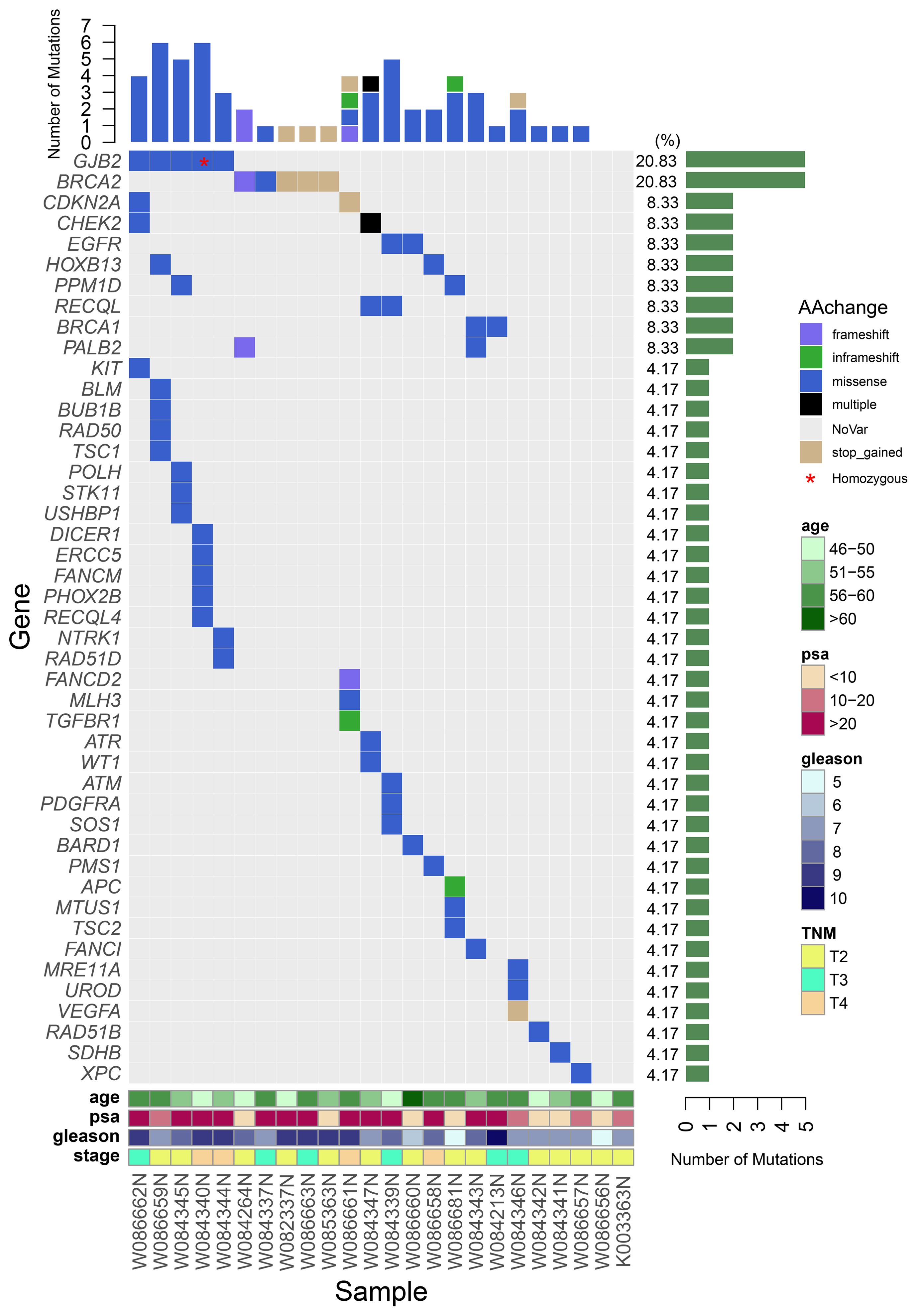
95% of researchers rate our articles as excellent or good
Learn more about the work of our research integrity team to safeguard the quality of each article we publish.
Find out more
CORRECTION article
Front. Oncol. , 18 December 2024
Sec. Genitourinary Oncology
Volume 14 - 2024 | https://doi.org/10.3389/fonc.2024.1498329
This article is a correction to:
Germline Mutations in Patients With Early-Onset Prostate Cancer
 Tang Tang1†
Tang Tang1† Xintao Tan1†
Xintao Tan1† Ze Wang1
Ze Wang1 Shuo Wang1
Shuo Wang1 Yapeng Wang1
Yapeng Wang1 Jing Xu1
Jing Xu1 Xiajie Wei2
Xiajie Wei2 Dianzheng Zhang3
Dianzheng Zhang3 Qiuli Liu1*
Qiuli Liu1* Jun Jiang1*
Jun Jiang1*A Corrigendum on
Germline mutations in patients with early-onset prostate cancer
By Tang T, Tan X, Wang Z, Wang S, Wang Y, Xu J, Wei X, Zhang D, Liu Q and Jiang J (2022). Front. Oncol. 12:826778. doi: 10.3389/fonc.2022.826778
In the published article, there was an inconsistency between Figures 1 and 2. The mutation types for BRCA1 and BRCA2 are not accurately represented in Figure 1. The information provided in Figures 2 is correct - BRCA1 has two missense variants, and BRCA2 has 3 stop_gained variants, 1 frameshift, and 1 missense variant. The errors in Figure 1 occurred during the figure preparation process, where the mutation types for BRCA2 in patient W082337N and BRCA1 in patient W084213N were incorrectly color-coded. The corrected Figure 1 and its caption appear below.

Figure 1. A waterfall plot shows the mutation ratio, mutation type of the mutated genes, and the clinical features of the 24 patients. The top panel shows the number of the mutations in each PCa sample; the left panel shows the frequently mutated genes; the right panel shows the detection ratio of each mutated gene; the bottom panel shows the sample number and the clinical features of the corresponding patient.
In the published article, a correction has been made to Results, Cases and Pedigrees, Paragraph 1. The mutation listed for Patient A should be BRCA2 c.1799_1804del, p.Tyr600_Gly602delinsTer, as shown in Table 2 and Figure 3. This sentence previously stated:
“Results from Sanger sequencing indicate that his healthy brother shares the same germline mutation of BRCA2 (c.4211C>G, p.S1404Ter), and his father died of bladder cancer at the age of 60.”
The corrected sentence appears below:
“Results from Sanger sequencing indicate that his healthy brother shares the same germline mutation of BRCA2 (c.1799_1804del, p.Tyr600_Gly602delinsTer), and his father died of bladder cancer at the age of 60.”
The authors apologize for these errors and state that this does not change the scientific conclusions of the article in any way. The original article has been updated.
All claims expressed in this article are solely those of the authors and do not necessarily represent those of their affiliated organizations, or those of the publisher, the editors and the reviewers. Any product that may be evaluated in this article, or claim that may be made by its manufacturer, is not guaranteed or endorsed by the publisher.
Keywords: prostate cancer, early-onset, next-generation sequencing, germline mutations, homologous recombination associated genes
Citation: Tang T, Tan X, Wang Z, Wang S, Wang Y, Xu J, Wei X, Zhang D, Liu Q and Jiang J (2024) Corrigendum: Germline mutations in patients with early-onset prostate cancer. Front. Oncol. 14:1498329. doi: 10.3389/fonc.2024.1498329
Received: 18 September 2024; Accepted: 04 December 2024;
Published: 18 December 2024.
Edited and Reviewed by:
Ronald M. Bukowski, Cleveland Clinic, United StatesCopyright © 2024 Tang, Tan, Wang, Wang, Wang, Xu, Wei, Zhang, Liu and Jiang. This is an open-access article distributed under the terms of the Creative Commons Attribution License (CC BY). The use, distribution or reproduction in other forums is permitted, provided the original author(s) and the copyright owner(s) are credited and that the original publication in this journal is cited, in accordance with accepted academic practice. No use, distribution or reproduction is permitted which does not comply with these terms.
*Correspondence: Qiuli Liu, bGl1cWl1bGk5MDA4MjdAMTYzLmNvbQ==; Jun Jiang, amlhbmdqdW5fNjRAMTYzLmNvbQ==
†These authors have contributed equally to this work and share first authorship
Disclaimer: All claims expressed in this article are solely those of the authors and do not necessarily represent those of their affiliated organizations, or those of the publisher, the editors and the reviewers. Any product that may be evaluated in this article or claim that may be made by its manufacturer is not guaranteed or endorsed by the publisher.
Research integrity at Frontiers

Learn more about the work of our research integrity team to safeguard the quality of each article we publish.